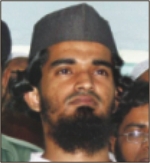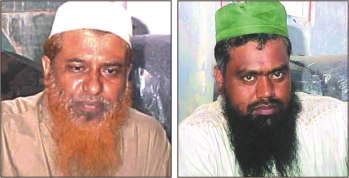[Dhaka Tribune] Al-Qaeda-inspired JMB, an outlawed Lion of Islam group responsible for carrying out series kabooms in 63 districts on this day in 2005, has lost much of its strength in the recent years, detectives say.
But, the recently-emerged Jama’atul Mujahideen Bangladesh (JMB) faction has appeared on the scene as a deadlier Lion of Islam group than the mainstream one, founded in 1998 by Shayakh Abdur Rahman.
Law enforcers blame the New JMB members for most of the recent assassination'>assassinations including the Gulshan and Sholakia attacks, while some of the attacks were claimed by another Lion of Islam group Ansarullah Bangla Team. Ansarullah was declared banned in May last year.
The New JMB is believed to be inspired by international terrorist group Islamic State
...formerly ISIS or ISIL, depending on your preference. Before that al-Qaeda in Iraq, as shaped by Abu Musab Zarqawi. They're very devout, committing every atrocity they can find in the Koran and inventing a few more. They fling Allah around with every other sentence, but to hear the pols talk they're not really Moslems....
and local Ahle Hadith group. It is operated by eight to ten coordinators under the leadership of a yet unidentified spiritual leader from a northern district, detectives say.
Police say they have incarcerated
I ain't sayin' nuttin' widdout me mout'piece!
around 150 New JMB members in the last two years.
The main JMB in June this year issued a statement describing the attacks they have conducted since 1998 and denied having involved in other attacks. It said former majlish-e-sura member Salahuddin alias Salehin alias Sajeeb became their chief after he was snatched from a prison van in February 2014.
In another statement released on July 31, the JMB claimed they had no connection with the Gulshan attack when 23 people mostly foreigners were killed in a restaurant on July 1.
The previous chief, Jamaat-e-Islami
...The Islamic Society , founded in 1941 in Lahore by Maulana Sayyid Abul Ala Maududi, aka The Great Apostosizer . The Jamaat opposed the independence of Bangladesh but has operated an independent branch there since 1975. It maintains close ties with international Mohammedan groups such as the Moslem Brotherhood. the Taliban, and al-Qaeda. The Jamaat's objectives are the establishment of a pure Islamic state, governed by Sharia law. It is distinguished by its xenophobia, and its opposition to Westernization, capitalism, socialism, secularism, and liberalist social mores...
leader Maulana Saidur Rahman, has been in jail since 2010 while its founder was hanged in 2007 along with several other policymakers including Siddiqur Rahman alias Bangla Bhai.
The group was banned on February 23, 2005.
After the August 17 blasts carried out in 511 places, the JMB carried out several suicide kabooms killing at least 33 people before its top leaders were arrested in early 2006. The notorious group came to light by establishing a reign of terror in Rajshahi and NATO
...the North Atlantic Treaty Organization. A collection of multinational and multilingual and multicultural armed forces, all of differing capabilities, working toward a common goal by pulling in different directions...
re in 2004 by killing and torturing dozens of people, in the name of operations against forces of Evil linked to leftist parties and under the patronisation of some BNP-Jamaat leaders, and the attack on Prof Humayun Azad.
Around 160 cases were filed against the JMB leaders and patrons across the country regarding these incidents. But verdicts have been given in only 88 of the cases in the last 11 years.
At least 51 cases are still waiting for disposal in different district courts.
In the 88 cases, 35 bully boyz were given death penalty, and of them, only six have been executed so far. The other cases are pending with the top court. The courts sentenced 131 bully boyz to life-term imprisonment in these cases.
Four out of the 18 cases filed over 33 blasts in Dhaka city on this day in 2005 have been quashed by the courts.
According to the Police Headquarters data, police gave final report in 17 out of 160 cases clearing the accused. The number of people sued in the 143 other cases was 242 but charges were pressed against 1,157 people. Investigators say 960 of the accused have been arrested so far. However,
ars longa, vita brevis...
the number of bully boyz who secured bail could not be known.
In the recent years, the main JMB members were responsible for several assassination'>assassinations that include Mohammad Shahidullah at Tanore in Rajshahi on May 6, retired sergeant instructor of Kashimpur jail Rustom Hawlader in Gazipur on April 25, Pir Khijir Khan in Badda area of Dhaka on October 5 last year, popular preacher Sheikh Nurul Islam Faruqi in Dhaka on August 27, 2014, and self-proclaimed Pir Lutfar Rahman, his son and four disciples at Gopibagh in Dhaka on December 21, 2013. |
 A court here yesterday awarded 10 years' imprisonment to Javed Iqbal alias Mohammad, 28, Chittagong divisional chief of outlawed Jamaatul Mujahideen Bangladesh (JMB), in a case filed in connection with countrywide serial blasts on August 17, 2005.
A court here yesterday awarded 10 years' imprisonment to Javed Iqbal alias Mohammad, 28, Chittagong divisional chief of outlawed Jamaatul Mujahideen Bangladesh (JMB), in a case filed in connection with countrywide serial blasts on August 17, 2005. 
 The government yesterday declared Tk 50 lakh each as reward for information leading to arrest of
The government yesterday declared Tk 50 lakh each as reward for information leading to arrest of  In the wake of the recent spate of terror attacks including the August 17 countrywide bomb blasts, the government yesterday banned all activities of another Islamist outfit,
In the wake of the recent spate of terror attacks including the August 17 countrywide bomb blasts, the government yesterday banned all activities of another Islamist outfit,